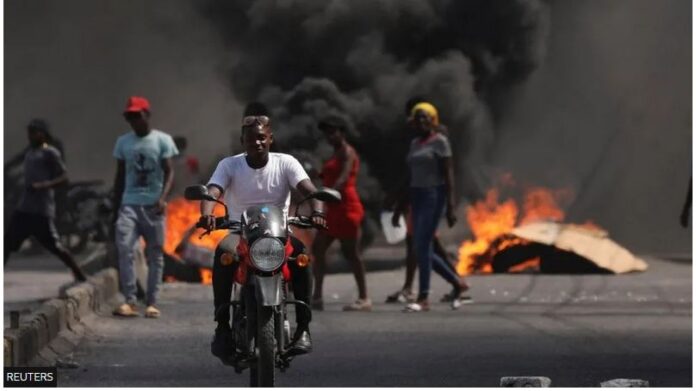Armed gangs have conducted a daring raid on the main prison in Haiti’s capital, Port-au-Prince, resulting in the escape of a large number of inmates. According to a local journalist speaking to BBC News, the majority of the approximately 4,000 male prisoners held at the facility have now fled. Among those incarcerated were members of gangs implicated in the assassination of President Jovenel Moïse in 2021. This incident comes amidst a backdrop of escalating violence in Haiti, a country known as the poorest in the Americas, with a significant portion of Port-au-Prince under the control of gangs seeking to overthrow Prime Minister Ariel Henry.
The recent wave of violence began when Prime Minister Henry departed for Nairobi to discuss the potential deployment of a Kenyan-led multinational security force to Haiti. Gang leader Jimmy Chérizier, also known as “Barbecue,” orchestrated a coordinated attack with the goal of removing Henry from power. Chérizier, a former police officer accused of involvement in several massacres in Port-au-Prince, rallied armed groups across the country to join forces against the government.
The situation deteriorated further as a series of shootings claimed the lives of four police officers and left five others wounded. The French embassy in Haiti issued a warning advising against travel in and around the capital due to the escalating violence. Despite a plea from Haiti’s police union for military assistance in securing the prison, the facility was breached late on Saturday.
Reports indicate that the prison gates remained open on Sunday, with no law enforcement presence in sight. The chaotic scene saw three inmates who attempted to flee gunned down in the courtyard. In a sign of the dire circumstances, 99 prisoners, including former Colombian soldiers implicated in the assassination of President Moïse, opted to stay in their cells to avoid potential harm.
Haiti has been in turmoil since the assassination of President Moïse, with no successor in place and elections postponed since 2016. A political agreement stipulated that new elections would be held and unelected Prime Minister Henry would step down by February 7th, a deadline that has not been met. The United Nations reported a sharp increase in gang violence in Haiti, with over 8,400 individuals falling victim to killings, injuries, and kidnappings in the previous year.
The security situation in Haiti remains precarious, with the brazen prison break exposing the country’s vulnerabilities and deepening the ongoing crisis. As the government struggles to restore order and address the root causes of violence, the future of Haiti hangs in the balance.

